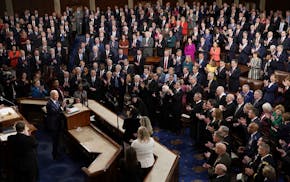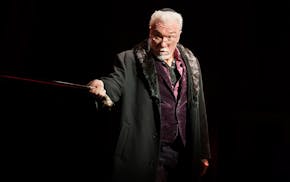Dismissing Uber and Lyft's vows to leave town and declaring a victory for a sector of underpaid workers, a veto-proof majority of the Minneapolis City Council Thursday approved a pay increase for rideshare drivers that Mayor Jacob Frey immediately pledged to veto.
The vote was 9-4, enough to override the veto if that vote were to hold.
If the council overrides the veto later this month, both ride-hailing companies said Thursday they will cease operations in the city — and perhaps the entire state — on May 1, the day the pay increase will take effect.
Uber and Lyft are the only two rideshare operationslicensed to operate in Minneapolis, although several entities have indicated an interest in starting up in the city.
Supporters, including organized groups of drivers and some labor advocates, say the approved set of minimum pay scales and other protections is the best way to ensure drivers earn the equivalent of the city's $15.57 hourly minimum wage. While driving for Uber or Lyft is often seen as a side gig, it has become the sole source of income for many drivers.
"If employers leave because they are paying sub-minimum wages and companies step in who pay minimum wages, I believe that's a win for our city," said Council Member Jason Chavez.
Uber and Lyft, however, say the minimums are too high to make doing business here worthwhile. In order to make their margins, the companies say they would be forced to nearly double fares, resulting in so few riders that the business model would collapse.
The vote came on the eve of a state report that could explain which rates would equate to specific actual earnings for drivers — a tricky figure to nail down in the dynamic pricing universe of ridesharing. An attempt to delay the council vote to await that report fell short Thursday.
Before the vote, Frey pleaded for the council to wait for the state report and soften its demands to a level that he says Uber and Lyft would accept — but would still effectively nearly double the rates drivers earn. That didn't happen. The measure the council approved Thursday is similar to one the mayor vetoed last year.
Opponents of the plan include business leaders, bar and restaurant associations. Also concerned: some in the disability community. They note that many people unable to drive rely on rideshare companies, often with public aid vouchers, to travel to work, medical appointments, or to see friends and family.
In the past week, the rideshare companies upped their pressure on the council to reject the driver pay increase. Uber took out ads on the home page of the Star Tribune and on local radio. Lyft sent letters to council members, appealing to their sense of economic justice by offering figures showing that the typical Minneapolis rider is working class.
During a three-month period in the summer of 2023, some 7,000 Uber drivers provided nearly 300,000 rides in the metro area, according to figures the company supplied.
Following Thursday's vote, Uber did not directly address the action in Minneapolis, but issued a statement noting the company's support for a state — not local — solution to drivers' wage concerns.
"Uber supports comprehensive statewide legislation that guarantees drivers $35/hr minimum earnings while working and protects their flexibility and independence," the statement read. "If this ordinance is enacted, we look forward to working with drivers, riders and the legislature to bring rideshare back."
Drivers react
Following the vote, drivers at City Hall cheered the council's decision.
"This is great! This is historic! Thank you council members," shouted driver Farhan Badel.
Matthew McGlory, who said he's driven over 10,000 rides for Lyft and nearly as many for Uber, said he ends up earning less than half the price the app shows to riders — with tip included.
The amount of business travel, the Delta airport hub and the amount of large national events based in the city make him doubtful that Uber and Lyft would leave Minneapolis.
"I think that is a poker bluff," McGlory said.
Seeing big companies make 60% percent of rides when the drivers are the ones providing the service just doesn't make sense, said Marianna Brown, who has been a driver in both New York and more recently in Minneapolis.
"Why should we let the big corporations make all the money when we as little people make nothing?" Brown asked.
Brown showed screenshots on her phone of particularly lowball offers from the app; one rider was offered $130 for a 4 hour, 45 minute drive, she said.
What drivers get
The plan approved Thursday guarantees a floor of $1.40 per mile and 51 cents per minute. Frey had been pushing a plan that set a minimum payment of $1.20 per mile and 35 cents per minute.
The plan approved by the council includes additional provisions, like a $5 minimum payment for any ride, annual increases for drivers, and restrictions on how money can be deducted from drivers' wages.
How they voted
Voting in favor were Council President Elliott Payne, Council Vice President Aisha Chughtai, and Council Members Robin Wonsley, Jeremiah Ellison, Jamal Osman, Katie Cashman, Andrea Jenkins, Jason Chavez and Aurin Chowdhury.
Voting against were Council Members Michael Rainville, LaTrisha Vetaw, Emily Koski and Linea Palmisano.
What's next
The state study set to be released Friday comes amid a push to raised the pay and working standards of rideshare drivers statewide.
The Legislature passed a driver pay plan last year, but Gov. Tim Walz vetoed it amid opposition from Uber and Lyft.
Walz established a task force, including drivers and company representatives, to look into the matter and recommend a plan. The group finished its work without specific rate recommendations — but before a study by the state Department of Labor and Industry had concluded. The study is the first in Minnesota to examine aggregate data from the rideshare companies, and one Frey said the council should have waited for.
"The statewide report is literally going to be released tomorrow," Frey said. "It's irresponsible to pass policy today when we'll have the data tomorrow.
"Supporters of the council's plan on Thursday noted that they could change the rates before they become effective May 1.
Staff writer Zoe Jackson contributed to this report.

A Minneapolis woman's Kia was stolen 5 times: 'I am going out of my mind'

Who are Minnesota's representatives and senators bringing to the State of the Union address?
Here are the issues at stake as Minneapolis raises pay for Uber and Lyft drivers

Twin Cities dance community presses for support ahead of Cowles Center going dark
